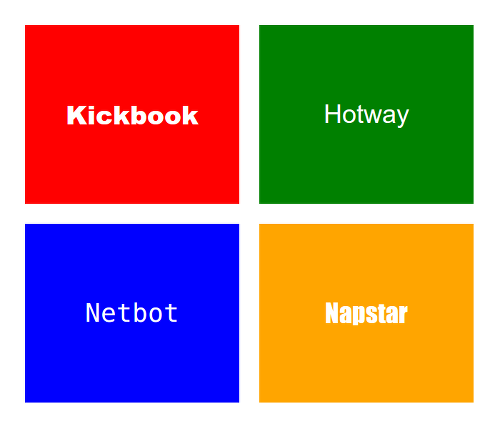
Digital Lengua – Babycastles, 137 West 14th St, Manhattan –
5:30pm Sunday November 20
This reading of computer-generated literature in English and Spanish
serves as the global book launch for two titles:
2×6
Nick Montfort, Serge Bouchardon, Andrew Campana, Natalia Fedorova,
Carlos León, Aleksandra Ma?ecka, Piotr Marecki
Les Figues, Los Angeles: Global Poetics Series
http://lesfigues.com/book/2×6/
256 pp.
Autopia
Nick Montfort
Troll Thread, New York
http://trollthread.tumblr.com/post/152339108524/nick-montfort-autopia-troll-thread-2016-purchase
256 pp.
Montfort will read from these two books, reading English and Spanish
texts from 2×6. Paperback copies will be available for purchase. The
short programs that generated these books are printed in the books and also
available as free software online.
Läufer will read from his projects Bigrammatology and WriterTools™, in
both cases, in Spanish and English.
Montfort and Läufer will read from work done as part of the Renderings
project and as part of another project, Heftings.
The Renderings project, organized by Montfort and based at his
lab, The Trope Tank, involves locating computational literature (such as
poetry generating computer programs) from around the globe and translating
these works into English. Läufer and Montfort will read from two
Spanish-language poetry generators, from Argentina and Spain, and from
translations of them.
The Heftings project, also organized by Montfort through The
Trope Tank, involves making attempts, often many, at translating conceptual,
constrained, concrete & visual, and other types of literary art that are
generally considered to be impossible to translate. Montfort and Läufer will
read from some short works that are originally in Spanish or English and
works that have Spanish or English translations.
Nick Montfort develops computational art and poetry, often
collaboratively. His poetry books are #!, Riddle & Bind, and
Autopia; he co-wrote 2002: A Palindrome Story and 2×6. His
more than fifty digital projects, at http://nickm.com, include the
collaborations The Deletionist, Sea and Spar Between, and the
Renderings project. His collaborative and individual books from the MIT
Press are: The New Media Reader, Twisty Little Passages, Racing the Beam,
10 PRINT CHR$(205.5+RND(1)); : GOTO 10, and most recently Exploratory
Programming for the Arts and Humanities. He lives in New York and
Boston, offers naming services as Nomnym, and is a professor at MIT.
Milton Läufer is an Argentinian writer, journalist and teacher.
Currently he is doing a PhD at New York University focused on digital
literature in Latin America. He is the 2016-2017 writer-in-residence of
The Trope Tank, MIT. In 2015 he published Lagunas, a partially
algorithmic-generated novel, which —as most of his work— is available online
at http://www.miltonlaufer.com.ar. He has participated in art exhibitions in
Latin America, the US and Europe. He lives in Brooklyn.
Digital Lengua – Babycastles, 137 West 14th St, Manhattan – 5:30pm Domingo, Noviembre 20
Esta lectura de literatura generada por computadora en español e inglés
oficiará, a la vez, de lanzamiento para los siguientes dos títulos:
2×6
Nick Montfort, Serge Bouchardon, Andrew Campana, Natalia Fedorova,
Carlos León, Aleksandra Ma?ecka, Piotr Marecki
Les Figues, Los Angeles: Global Poetics Series
http://lesfigues.com/book/2×6/
256 págs.
Autopia
Nick Montfort
Troll Thread, New York
http://trollthread.tumblr.com/post/152339108524/nick-montfort-autopia-troll-thread-2016-purchase
256 págs.
Montfort leerá de ambos libros, en español e inglés para el caso de
2×6. Habrá copias impresas disponibles para su compra. Los breves
programas que generan el código se encuentran en dichos libros y también en
línea como software libre (y gratuito).
Läufer leerá de sus proyectos Bigrammatology y WriterTools™, en español e inglés en ambos casos.
Los autores leerán también de los trabajos realizados en el marco de los
proyecto Renderings y Heftings.
El proyecto Renderings, organizado por Montfort con base en su
laboratorio, The Trope Tank, involucra la búsqueda de literatura
computacional (tal como poesía generada por programas de computadora) a lo
largo del globo y la traducción de estos proyectos al inglés. Läufer y
Montfort leerán de dos generadores de poesía en español, uno de Argentina y
otro de España, así como sus traducciones.
El proyecto Heftings, también organizado por Montfort a través de
The Trope Tank, consiste en la producción de intentos, a menudo
muchos, de traducir obras literarias conceptuales, formalistas, concretas o
visuales tales que son generalmente consideradas imposibles de traducir.
Montfort y Läufer leerán algunos trabajos breves originalmente en español o
inglés y trabajos que poseen traducciones españolas o inglesas.
Nick Montfort desarrolla arte y poesía computacional,
frecuentemente en colaboración. Entre sus libros se destacan #!,
Riddle & Bind y Autopia; y, en colaboración, 2002: A
Palindrome Story y 2×6. Entre sus más de cincuenta proyectos
digitales, en http://nickm.com, se encuentran las colaboraciones The
Deletionist, Sea and Spar Between y Renderings, un
proyecto centrado en la traducción. Sus libros de MIT Press son The New
Media Reader, Twisty Little Passages, Racing the Beam,
10 PRINT CHR$(205.5+RND(1)); : GOTO 10 y, recientemente, Exploratory
Programming for the Arts and Humanities. Vive en New York y Boston,
ofrece servicios de nombres como Nomnym, y es un profesor en MIT.
Milton Läufer es un escritor, periodista y docente argentino.
Actualmente se encuentra realizando un PhD en la New York University acerca
de literatura digital in América Latina. Es el escritor en residencia de
The Trope Tank para el período 2016-2017, en MIT. En 2015 publicó la
novela generada parcialmente por algoritmos Lagunas, la cual —como el
resto de su obra el literatura digital— es accesible desde su sitio,
http://www.miltonlaufer.com.ar. Ha participado de exposiciones en América
Latina, Estados Unidos y Europa. Vive en Brooklyn.







